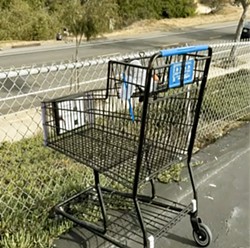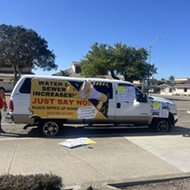[
{
"name": "Promo Temp Targeted",
"id": "PromoTempTargeted",
"class": "inlineCenter",
"insertPoint": "4",
"component": "15511697",
"requiredCountToDisplay": "0"
},
{
"name": "Ad - Medium Rectangle CC01 - 300x250 - Inline Content",
"class": "inlineCenter",
"insertPoint": "8",
"component": "15582119",
"requiredCountToDisplay": "12"
},{
"name": "Ad - Medium Rectangle LC01 - 300x250 - Inline Content",
"class": "inlineCenter",
"insertPoint": "18",
"component": "15582122",
"requiredCountToDisplay": "22"
},{
"name": "Ad - Medium Rectangle 9 - 300x250 - Inline Content",
"class": "inlineCenter",
"insertPoint": "28",
"component": "15582121",
"requiredCountToDisplay": "32"
}]
Atascadero City Councilmember Charles Bourbeau occasionally loads up his truck with shopping carts collected by the city and returns them to their respective stores.
"I do weird things like that," Bourbeau said during a June 5 phone call with New Times over the audible clang of metal on metal. "Just while we were talking, I loaded five carts, and I'm off to Food 4 Less."
It was his 15th or 16th trip to the city's Public Works yard on the same mission. So far, he's returned about 80 carts to grocery stores around town, but Atascadero accumulates abandoned and impounded shopping carts faster than the stores can repossess them.
"I like to do physical volunteer things," Bourbeau said. "From my perspective, these carts represent stolen property. These are not something you're entitled to take and use for your personal use."
But people do. The carts leave store parking lots and get abandoned somewhere—often damaged and full of things picked up along the way. Residents call the city or the Police Department. Eventually, the city picks the carts up and takes them to the Public Works yard. Sometimes the cart owners will retrieve them.
During a May 14 City Council meeting where council members discussed what a potential shopping cart ordinance might entail, Bourbeau listed off the number of carts in the yard: 38 from Vons, 17 Smart & Final, six Grocery Outlet, three Rite Aid, six Big Lots, six Food 4 Less, one Walgreens, seven 99 Cents Store, "and strangely enough, two Kmarts."
Atascadero Police Chief Dan Suttles said enforcing the state Business and Professions code that covers shopping carts is difficult. Although being in possession of a stolen shopping cart is illegal and qualifies as a misdemeanor, the SLO County District Attorney's Office recently let law enforcement know that it would no longer file that charge.
Deputy District Attorney Jerret Gran confirmed to New Times that the office sent out a memo in February saying it wouldn't file "standalone violations" for illegal possession of a shopping cart. The memo states that prosecutions of the crime usually involve unhoused individuals storing their personal belongings in a cart.
"An individual charged with this crime is entitled to a jury trial. It is unlikely that a San Luis Obispo County jury will return a verdict of guilty under those circumstances," the memo states, adding that even if convicted, the defendant likely wouldn't serve jail time and/or wouldn't be able to afford the fine. "Under these circumstances, a successful conviction is unlikely to deter future possession of shopping carts by either the specific defendant or similarly situated defendants."
Gran said the new policy is similar to what's in place in both Santa Barbara and Monterey counties.
Suttles also said that under the state code, the city is required to wait three days after being notified before impounding the cart, which also has to display verbiage denoting the cart's owner. Once it reaches the yard, Public Works can reach out to the store it belongs to. That store has three days to retrieve it—unretrieved carts usually get recycled, Public Works Director Nick DeBar told council members.
"Individuals are taking carts for some period of time and leaving them on the street, and everybody else is bearing the cost," Mayor Heather Moreno said. "Is it just the cost of being a city?"
Chief Suttles said passing an ordinance would be a way for the city to share the burden and cost of cart recovery with the local stores they belong to. He spoke with the cities of San Luis Obispo and Morro Bay—other local cities that have shopping cart ordinances on the books—and said they approached the ordinance as more of a partnership with the stores.
Morro Bay approved its ordinance in December 2023. Morro Bay Police Chief Amy Watkins told New Times that it was an effort to address some of the blight and hazards caused by carts that were being left "all over the place, damaged and destroyed and in our waterways." In the last seven months, Watkins said the city's made progress on the issue.
She added that shopping carts are expensive, between $200 to $300 each, and stores don't want to lose them, but logistics such as staffing and resources make it hard to retrieve stolen and abandoned carts. The ordinance gave the businesses something to take back to their corporate offices for more funding to deal with the issue.
That ordinance gives the city's six businesses that have shopping carts options when it comes to cart retrieval: They can contract with someone to go around town picking up carts once or twice a month; put locking wheels on the carts; or prevent the carts from being able to leave the store somehow.
These are some options that the Atascadero City Council directed staff to consider for a potential future ordinance. At the same May 14 meeting, the council also voted to add another $30,000 to the encampment cleanup budget, something Bourbeau said directly correlates with the shopping cart issue, as carts enable people to move heavier and more objects.
"When [residents] see the accumulation of what to them looks like garbage, they see it as a degradation of the beauty of the community and degradation of quality of life within the community, and I think that shopping carts facilitate that," Bourbeau told New Times. "Multiple trips and the next thing you know, they have an encampment full of stuff. ... Next thing you know, we're paying a fair amount of money to ... pick up stuff." Δ
Latest in News
Comments
Showing 1-1 of 1
Readers also liked…
-

SLO police identify alleged driver who hit and killed couple
Dec 22, 2022 -

When the levee breaks: Oceano residents, county officials walk a tightrope of regulations to manage Arroyo Grande Creek, which some say led to the levee's failure in January
May 18, 2023 -

Cal Poly report highlights offshore wind's potential to spur green energy transition
Jun 8, 2023









